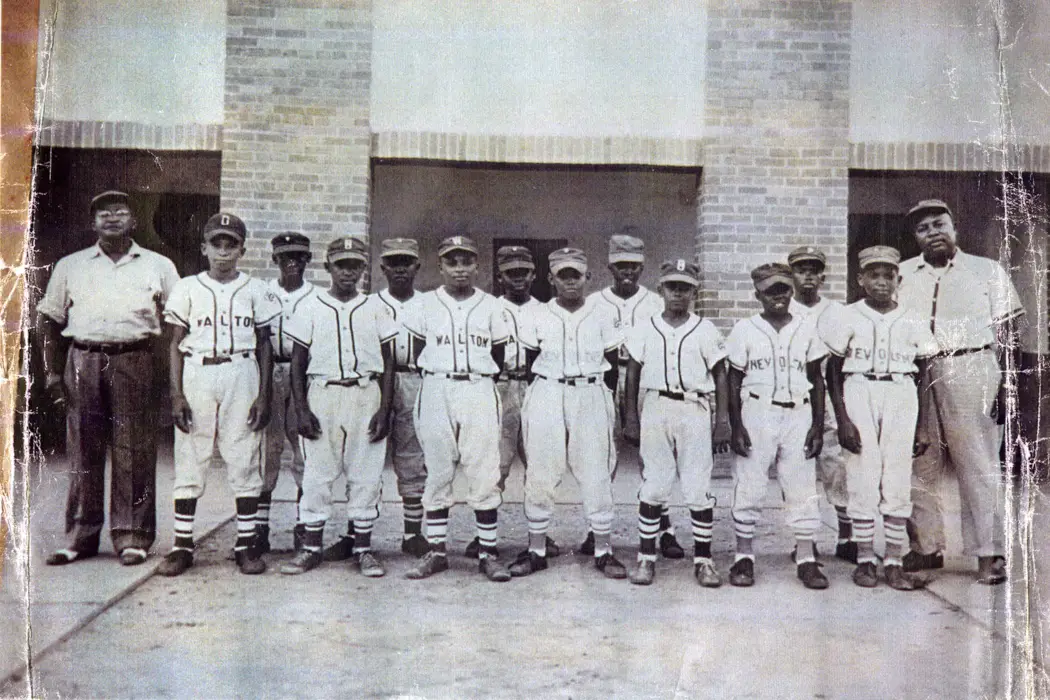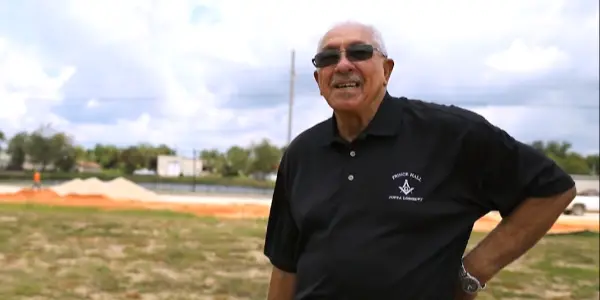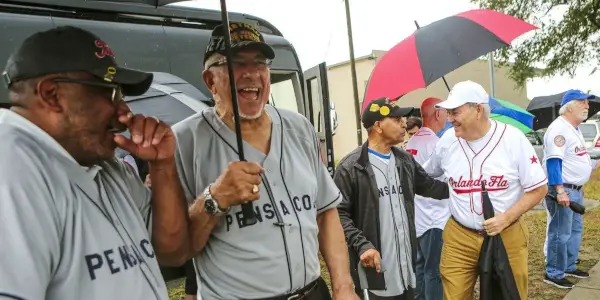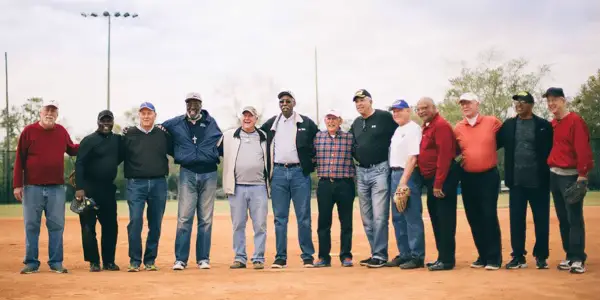LONG TIME COMING: A 1955 BASEBALL STORY: Optimism Over Racism Out On The Baseball Diamond

Tynan loves nagging all his friends to watch classic movies…
This is an important caveat. I am a Dodger fan. If that offends you in any way please stop reading now…
All joking aside, I take the history of my team quite seriously and one of the reasons I think the Dodgers are the greatest baseball team is bigger than the game. Jackie Robinson broke the color barrier, ruling baseball for generations, in 1947 and he did it with the Brooklyn Dodgers.
For me, it’s the single most important moment in America’s “National Pastime”. And with it, he has remained the game’s most crucial player. It’s no wonder the entire league has jointly retired his number and he has been accorded innumerable well-deserved honors including membership in the Baseball Hall of Fame.
Earlier this year, when I heard the sad news of Don Newcombe’s passing, it affected me deeply because he was one of the last links to the Dodger dynasty of the ’50s; he is also the final living member of the exceptional trifecta including Robinson and Roy Campanella. They were so important not only in helping the Dodgers take home their first title against the perennially successful Yankees, but they were also three of the only African-Americans in the Major Leagues at that time.
It was 1955. Many more great black players followed like Hank Aaron, Willie Mays, and Ernie Banks and yet despite the work already completed, they still faced similar discrimination on and off the field. All this proves important background information because, in a world where MLB baseball was meant to reflect our society, it proved a curious paradox.
In theory, because baseball was integrated (even tenuously so), the nation at large was meant to reflect the same ideals. And yet still, most overtly in the southern states, bigotry and Jim Crow mentalities still reigned supreme. We must only look to a fateful Little League game occurring that same year in 1955. It was a microcosm of the country at large, reflecting the nation’s incongruencies. This brings us to the core drama behind Jon Strong‘s Long Time Coming: A 1955 Baseball Story.
Two Sides To Every Story
The documentary addresses the story through two points of view, now over 60 years removed from their fateful game all those years ago. Will Preyer is a native of Pensacola Florida. He seems well aware of the time lapse even as he’s made his individual peace with it. Eyes bright and warm, he says, “If you live long enough you’ll see time will catch up with you.” It’s just the way it is.
One of the first magical moments comes when he goes down the line of an old black and white picture listing off the names of his teammates – his comrades – and each face flashes across the screen smiling, now older and wiser from the years. This is our introduction to the Pensacola Jaycee All-Stars: then and now. You’ve never heard of them but you’ll come to admire them.

Then, we switch over to Stewart Hall, a native of Orlando Florida, which, while in the same state, might as well be a world away. He too waxes poetic, a little wistful about the changes around him. “Every time a house goes, there goes another memory.” The ideas teased out are not revolutionary but they are worth considering nonetheless.
It conveniently juxtaposes these two sides, these two teams, these two radically divergent points of view. What it becomes is an examination of paradoxes in society. How small-town America could represent simpler, safer times yet on the other end of the spectrum conjure up images of repression and relegation. For fans of The Sandlot, there is a bit of this nostalgia wafting over the recollections of those from the small white community. For them, those really were like “The Wonder Years”.
But for the African-American boys, baseball was a much more vital component of their lives. This was not purely boyhood recreation; it was a release, a proofing ground, a space to practice work ethic in a world which was intent on keeping them down. Not coming from any kind of privilege, baseball was one of the few things they had to really better themselves with. It’s true that once you get on the field, skill takes precedence over anything – even skin color. As long as you’re allowed on the field, that is.
Recollections of Racism
In one interlude, Mr. Preyer takes a stroll to a statue honoring the uncrowned Confederate dead of the Civil War. He realizes others don’t think twice about it but he cannot help but imagine how many dead bodies of slaves are buried there too. It turns his stomach.
Likewise, his teammates recount their own versions of this deep-rooted tradition of prejudice. These are not isolated incidents. In fact, the peril becomes building up a callousness due to their sheer frequency. Whether it’s hearing about a white paper boy spitting out the N-word as he pelted a house with the morning paper.
Maybe it was a white store owner coming out to the street after he’d heard a cat call – threatening an African-American with a knife – to make sure he wasn’t the perpetrator. Then, of course, you have the proliferation of “Whites Only” establishments in the segregated south. The fact that these stories are tied to individuals gives them their own personal significance.

Then, in contrast, we hear the view from the other side. Interestingly, none of it is about experiences with blacks. Instead, it’s the complete lack of contact. In one telling line, Mr. Hall admits, “It’s awfully easy to be racist when you didn’t know the other race.” One of the other former Little Leaguer says, “You didn’t think about it one way or another.” In essence, you lived in your world and they lived in theirs. Some of the sentiments conveyed might make certain viewers uneasy and for good reason.
It’s this accepted status quo making the showdown on the baseball diamond back in 1955 feel so extraordinary. Actually provided the chance to compete, the Pensacola Jaycees traveled all the way to Orlando for the state tournament against the Orlando Kiwanis in an integrated ball game. This came in the wake of all the other teams in their district refusing to play them, choosing to forfeit rather than play a black team. It sounds absolutely ridiculous but it’s fact. What’s more, this was by no means an isolated incident in the South.
However, even if the stage seems set for a cinematic feel-good tale, this is not a Cinderella Story. It was just a game. Jittery in the foreign environment against an imposing opposition, the Jaycees wound up losing unceremoniously 5-0. Thankfully that was hardly the end of the journey…
Setting The Historical Context
It’s at this point Long Time Coming veers away from its central premise in order to take a bird’s eye view of civil rights issues and the battles over racial discrimination in our country. In some regards, the subsequent montage covering expansive amounts of history feels like a digression but it also proves very pointed. It’s a way to fit our unheralded story into this broader context. We are reminded of Sit-Ins, Vietnam, Lynchings, and the despicable murder of Emmett Till.
Sprinkled throughout the whole examination are notable talking heads including “The Home Run King” Hank Aaron, “The Iron Man” Cal Ripken Jr. and both Davey Johnson and Gary Sheffield. Andrew Young is also featured as a man who has long been a champion of civil rights and was a close confidante of the late Dr. King. Truthfully, it does feel like these interviews could potentially carry their own documentaries. Regardless, they help color this broader narrative with diverse perspectives.
These are all important points of reference (especially for the unacquainted) but the doc is at its best on this most intimate scale telling its own story. Because it represents these wider circumstances on the ground level in an intimate way.
60 Years Later
The final act gives real goosebumps. It truly is 60 years in the making. Those who still remain gather in the opposing dugouts on the same field they played on back in 1955. The game day nerves are forgotten and replaced. Instead, we see something new. The smiles on the faces. The brotherhood. The community.

The documentary’s title subtlely evokes Sam Cooke’s Magnum Opus “A Change is Gonna Come” so it seems fitting the faint notes of the enduring tune can be heard as they converge on the infield. As they cross the diamond, it feels cinematic but in a very real fashion. It’s in the manner in which real life can often write more heartwarming, extraordinary stories than fiction ever dared to muster up. This is such a moment.
Because this entire project does not make some ill-informed, wide-eyed prognostication about our world. This is where the historical context of then shows its vital importance now. It’s difficult to make the claim we live in a better world sometimes but even small steps like these are something. They are not the final victory, the ultimate goal, by any means. Still, they are baby steps, a foretaste of what might be someday and what I believe will be one day, if not in this sullied world of ours, hopefully, in the next.
As the final images roll by followed the credits, the words of “Brother” by The Brilliance (featuring spoken-word poet Propaganda) ring out with a resounding harmony. It’s not on par with the heady scope of Sam Cooke’s tune but it does suggest a radical form of love and a way of living contrary to a status quo of bigotry and hate. My prayer is that we can get there even if it takes far longer than 60 years.
Why do you think baseball is so closely tied to America’s complicated history of racism? How can a story like Long Time Coming practically help us pursue a better future? Tell us your thoughts in the comments below!
Long Time Coming is now available for streaming on Netflix.
Does content like this matter to you?
Become a Member and support film journalism. Unlock access to all of Film Inquiry`s great articles. Join a community of like-minded readers who are passionate about cinema - get access to our private members Network, give back to independent filmmakers, and more.
Tynan loves nagging all his friends to watch classic movies with him. Follow his frequent musings at Film Inquiry and on his blog 4 Star Films. Soli Deo Gloria.













